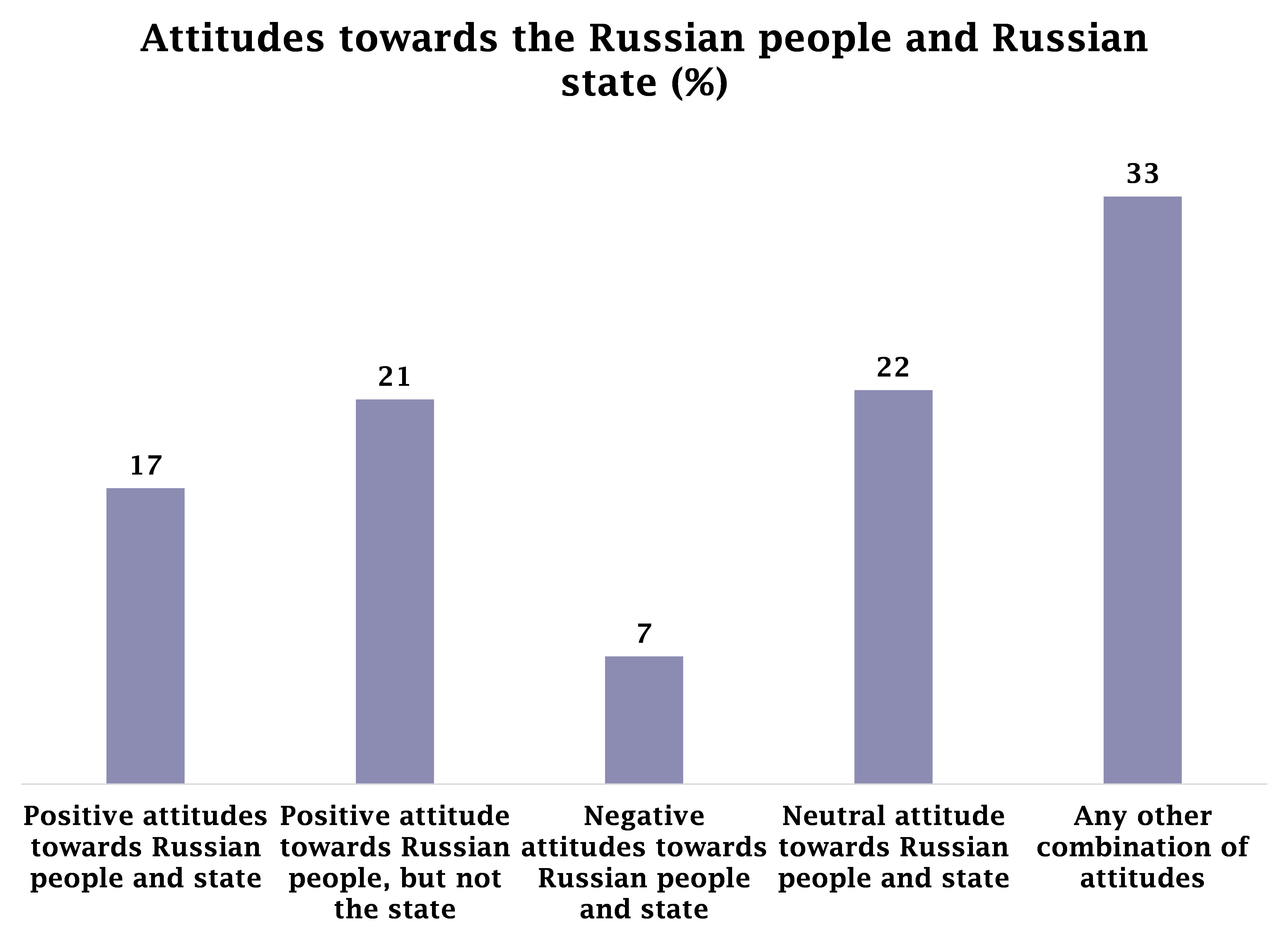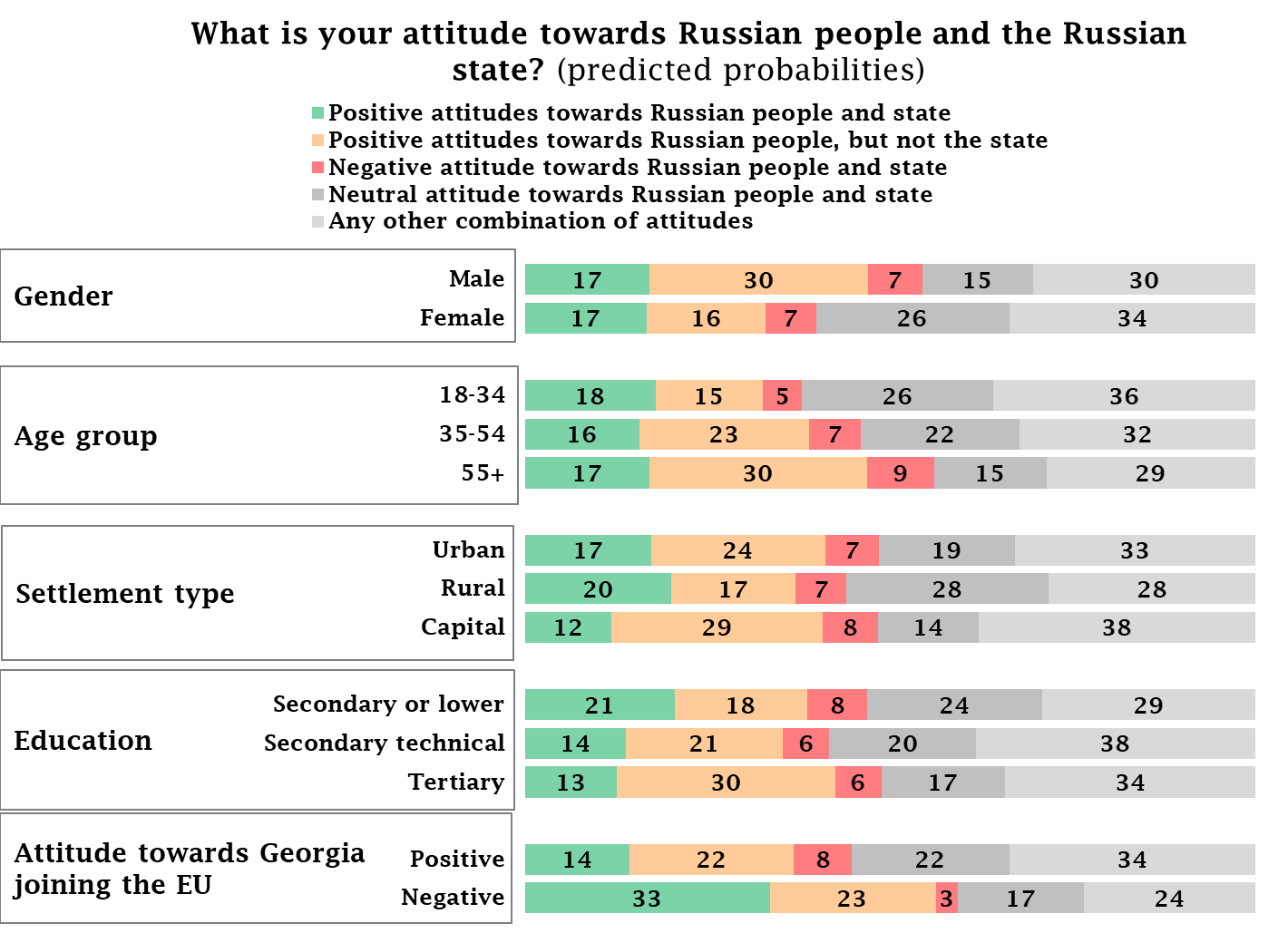
Given the hostile relations between Russia and Georgia over the last 30 years, Georgian public opinion towards their northern neighbour could be expected to be less than positive. But do Georgians differentiate between the Russian state and the Russian people?
A study CRRC-Georgia conducted for the Georgian Foundation for Strategic and International Studies (GFSIS) and the Friedrich-Ebert-Stiftung (FES) South Caucasus Office in 2021 shows that people have conflicting attitudes towards Russia and Russians.
The data suggest that the Georgian public’s attitudes towards Russian people and the Russian state differ significantly. Half of people living in Georgia (52%) report having a positive attitude towards Russian people, with only 7% reporting negative attitudes.
At the same time, half of the population (54%) reported having a negative attitude towards the Russian Federation, while only 18% held positive views.
A quote from one 29-year-old ethnic Georgian woman from Tbilisi who holds a higher education and who participated in a focus group reflects these sentiments:
‘For me, Russia is an occupier, but my [negative] attitude is not towards ordinary Russian people, because if my government did horrible things that would not mean that I am like that too. I adore Russian literature, but I dislike Russia with its ruler. But again, that does not mean that I despise the people’.
Overall, 17% of people reported having a positive attitude towards Russia and Russian people, 21% a positive attitude towards Russian people and a negative attitude towards the state, 7% a negative attitude towards both, 22% neutral attitudes towards both, and 33% a mixture of attitudes. Less than 1% had a positive attitude towards Russia and a negative attitude towards Russians; as a result, this category is not included in subsequent analysis.

Which set of attitudes people position themselves in was associated with a number of factors, according to a set of regression analyses.
Men were significantly more likely to have positive attitudes towards Russian people but not the state than women. Women were significantly more likely to report neutral or uncertain attitudes towards both.
Attitudes also vary by education level. People with secondary education or lower were significantly more likely to report positive attitudes towards Russia and Russians. In contrast, people with tertiary education reported more positive views towards Russians but not Russia.
People in Tbilisi were more likely to hold positive attitudes towards Russians but not Russia than in other settlement types, while people in rural areas were less likely to fall into this grouping and more likely to hold neutral views.
Older people were more likely to have positive views of Russians but not Russia. This finding might be explained by the closer relations which older people had with Russians during the Soviet Union.
Indeed, this view was often expressed in focus groups, with participants noting that friendships are less common among young people. One 50-year-old ethnic Georgian woman with a higher education from Samagrelo stated:
‘Considering we are neighbours, we should deepen relationships and make them better. People can make anything happen. Politics is one thing, but people’s power is boundless. My generation feels that way, but the younger generation feels differently. They don’t speak Russian either, and can’t imagine any kind of relationship with Russians. We, the older generation, have more nostalgic sentiments [and can] set politics aside.’
Attitudes also vary with foreign policy preferences. People with negative attitudes towards Georgia’s Euro-Atlantic integration also tended to be more likely to have positive views of both Russia and Russians. In contrast, those who were positive about Georgia’s Euro-Atlantic integration held a broader mix of views.
People who had a negative attitude towards Georgia joining NATO were roughly 2.5 times more likely (32%) to have a positive attitude towards Russian people and the state compared with people who held a positive attitude towards Georgia’s integration into NATO (13%).
The data showed a similar pattern with attitudes towards Georgia’s integration with the European Union.

The findings suggest that attitudes towards the Russian people and the Russian state differ in Georgia.
Men, those living in the capital, people with tertiary education, and older people held a more positive attitude towards the people, but not the state.
As younger people have relatively weak links with Russians, it is reasonable to assume that what goodwill exists towards Russians is likely to wane in the future. How dynamics play out given these findings though, remains an open question. What is clear though is that people with negative attitudes towards Georgia’s Euro-Atlantic integration also have more positive attitudes towards both Russia and Russians.
Note: The above quantitative analysis is based on two multinomial logistic regression models, where the dependent variable is attitudes towards the Russian state and Russian people with the following categories: Positive attitudes towards Russian people and state, positive attitudes towards Russian people but not state, negative attitude towards Russian people and state, Neutral attitude towards Russian people and state, any other attitude towards Russian people and/or state, excluding people who had positive attitudes towards the Russian state but negative attitudes towards Russians. This variable was generated using two survey questions, with one question about people’s attitudes towards the state and the other about attitudes towards Russian people. The independent variables include (a) demographic variables (gender, age, settlement type, and education) and attitudes towards joining the EU; and (b) demographic variables and attitudes towards joining the NATO.








